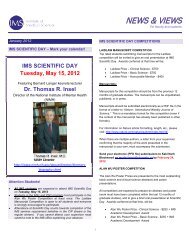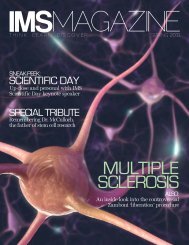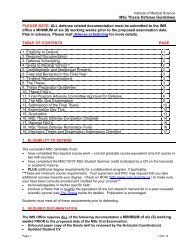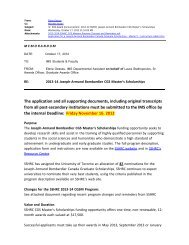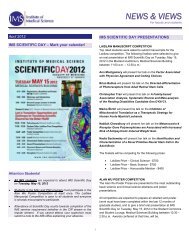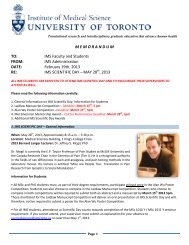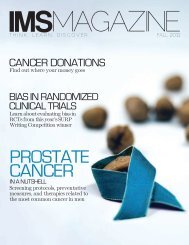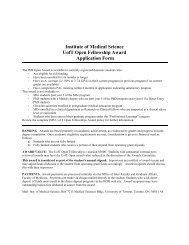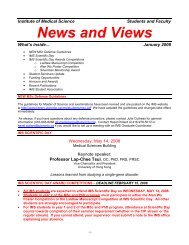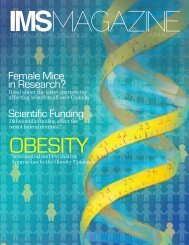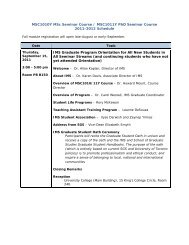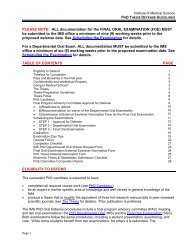IMS Magazine - Summer 2012 edition in PDF format - Institute of ...
IMS Magazine - Summer 2012 edition in PDF format - Institute of ...
IMS Magazine - Summer 2012 edition in PDF format - Institute of ...
You also want an ePaper? Increase the reach of your titles
YUMPU automatically turns print PDFs into web optimized ePapers that Google loves.
COMMENTARY<br />
Commentary<br />
On ‘A Reconcilable Conflict’,<br />
by Benjam<strong>in</strong> Mora (Spr<strong>in</strong>g <strong>2012</strong>)<br />
All ways <strong>of</strong> know<strong>in</strong>g are equal, but<br />
some are more equal than others<br />
By Adam Santoro, PhD student<br />
I would like to thank Benjam<strong>in</strong> Mora for submitt<strong>in</strong>g<br />
a thoughtful commentary <strong>in</strong> the previous<br />
issue <strong>of</strong> the <strong>IMS</strong> <strong>Magaz<strong>in</strong>e</strong>. Mr. Mora<br />
<strong>of</strong>fered a contrast<strong>in</strong>g op<strong>in</strong>ion to that which<br />
I presented <strong>in</strong> the W<strong>in</strong>ter <strong>2012</strong> issue, stat<strong>in</strong>g<br />
that “…flourish<strong>in</strong>g dialogue between science<br />
and religion <strong>in</strong> recent years is testimony to<br />
the fact that, far from be<strong>in</strong>g irreconcilably<br />
conflicted these two doma<strong>in</strong>s <strong>of</strong> human<br />
knowledge can fruitfully <strong>in</strong>teract.”<br />
Mr. Mora presented three arguments: firstly,<br />
that I was <strong>in</strong>correct to state that scientists<br />
who are religious have not thought deeply<br />
about the issue, or are act<strong>in</strong>g <strong>in</strong> a non-scientific<br />
manner; secondly, that my views succumb<br />
to an erroneous method <strong>of</strong> th<strong>in</strong>k<strong>in</strong>g<br />
called scientism; and thirdly, that I can only<br />
successfully support methodological (and<br />
not philosophical) naturalism, which allows<br />
for a great number <strong>of</strong> plausible and fruitful<br />
<strong>in</strong>teractions between science and religion.<br />
As per his first argument: Mr. Mora contends<br />
that there are numerous “top-th<strong>in</strong>k<strong>in</strong>g” scientists<br />
who have thought deeply about the<br />
issue at hand. He presented a list <strong>of</strong> “topth<strong>in</strong>kers,”<br />
presumably to illustrate how some<br />
<strong>in</strong>dividuals ma<strong>in</strong>ta<strong>in</strong> a high degree <strong>of</strong> scientific<br />
<strong>in</strong>tegrity and still th<strong>in</strong>k about the issue<br />
deeply. To this I would simply state that an<br />
<strong>in</strong>dividual’s scientific prowess does not necessarily<br />
translate to matters not published <strong>in</strong><br />
Science or Nature; because an <strong>in</strong>dividual is a<br />
leader with<strong>in</strong> his scientific field, it does not<br />
necessarily follow that he ma<strong>in</strong>ta<strong>in</strong>s sufficient<br />
scientific <strong>in</strong>tegrity when deal<strong>in</strong>g with issues<br />
outside <strong>of</strong> the published literature (especially<br />
those that enter the realm <strong>of</strong> philosophy).<br />
Mr. Mora listed a plethora <strong>of</strong> scientists, all <strong>of</strong><br />
whom are Christian. This is <strong>in</strong>deed curious,<br />
and raises numerous questions (i.e., why not<br />
list names <strong>of</strong> top-th<strong>in</strong>k<strong>in</strong>g scientists who are<br />
non-Christians?). I assume that it has to do<br />
with Mr. Mora’s theological bias, which leads<br />
me <strong>in</strong>to the rest <strong>of</strong> the discussion.<br />
As per his second and third arguments: Mr.<br />
Mora implies that scientists who support my<br />
viewpo<strong>in</strong>t suffer from scientism, which states<br />
that the scientific way <strong>of</strong> know<strong>in</strong>g is the only<br />
way to discover truth. Those who share Mr.<br />
Mora’s epistemic viewpo<strong>in</strong>t acknowledge<br />
that there are different ways <strong>of</strong> know<strong>in</strong>g,<br />
and theology and science are merely two <strong>of</strong><br />
such ways. With this worldview, theological<br />
know<strong>in</strong>g can <strong>in</strong>form one about the natural<br />
world, and science can <strong>in</strong>form one about theology,<br />
s<strong>in</strong>ce both ways <strong>of</strong> know<strong>in</strong>g are equally<br />
valid. There is a problem with this view. It is<br />
undoubtedly the case that a priori theological<br />
beliefs necessarily dictate those natural<br />
phenomena that can be expla<strong>in</strong>ed by science<br />
(e.g., someth<strong>in</strong>g <strong>in</strong>herently bor<strong>in</strong>g and obviously<br />
un-div<strong>in</strong>e as Brownian motion), and<br />
those that seem<strong>in</strong>gly require theology (e.g.,<br />
evolution vs. Intelligent Design). To those<br />
with this view, theology only succumbs to<br />
science when it would be to approach <strong>in</strong>sanity<br />
to deny the scientific truth (see: the history<br />
<strong>of</strong> evolution, the Heliocentric Model,<br />
etc.). Thus, it is not a simple case <strong>of</strong> complementary<br />
systems <strong>of</strong> know<strong>in</strong>g that can live <strong>in</strong><br />
harmony; all ways <strong>of</strong> know<strong>in</strong>g are apparently<br />
equal, but some are more equal than others.<br />
Regardless, straw-men aside, I was careful<br />
to present an argument that did not depend<br />
on a s<strong>in</strong>gle way <strong>of</strong> know<strong>in</strong>g. Instead, I (perhaps<br />
naively) assumed that scientists support<br />
methodological naturalism – a viewpo<strong>in</strong>t<br />
that says all natural phenomena must be<br />
expla<strong>in</strong>ed by science, and theology cannot<br />
dictate when it cannot. Mr. Mora should<br />
take note that the theological way <strong>of</strong> know<strong>in</strong>g<br />
is not lost with this worldview; <strong>in</strong>stead<br />
it is limited to the know<strong>in</strong>g <strong>of</strong> non-natural<br />
th<strong>in</strong>gs. So, much like how <strong>in</strong> some views<br />
theology <strong>of</strong>ten dictates the limits <strong>of</strong> science,<br />
from my perspective it is science that dictates<br />
the limits <strong>of</strong> theology. Methodological naturalism<br />
does not assume that the theological<br />
way <strong>of</strong> know<strong>in</strong>g is <strong>in</strong>valid or <strong>in</strong>correct; it simply<br />
states that it cannot conflict with science<br />
when deal<strong>in</strong>g with the natural world. In my<br />
article I merely <strong>in</strong>terpolated some conclusions<br />
from this viewpo<strong>in</strong>t. Firstly, if theology<br />
cannot step on the toes <strong>of</strong> science on matters<br />
concern<strong>in</strong>g the natural world, then nearly<br />
all theistic religions are to be rejected (s<strong>in</strong>ce<br />
they all make naturalistic claims <strong>in</strong> some<br />
capacity, all <strong>of</strong> which conflict with scientific<br />
pr<strong>in</strong>ciples and natural laws). Second, deism<br />
is the only position a scientist/methodological<br />
naturalist can support, s<strong>in</strong>ce this position<br />
does not conta<strong>in</strong> conflict<strong>in</strong>g views <strong>of</strong> natural<br />
phenomena. Thirdly, a scientist should support<br />
methodological naturalism fully – to<br />
pick and choose avenues where science is to<br />
be usurped by theology is to lack scientific<br />
<strong>in</strong>tegrity. Thus, an <strong>in</strong>dividual who is properly<br />
scientific and truly accepts methodological<br />
naturalism can be a deist, at most.<br />
As a f<strong>in</strong>al po<strong>in</strong>t, it is commonly argued that<br />
methodological naturalism can be <strong>in</strong> harmony<br />
with theology s<strong>in</strong>ce a theistic God can<br />
act upon the natural world <strong>in</strong> ways that we<br />
cannot detect (and hence, by their very nature<br />
are <strong>in</strong> tune with natural laws and can<br />
be studied with science). For example, God<br />
could drive mutations dur<strong>in</strong>g evolution <strong>in</strong><br />
subtle ways that we cannot detect. This is<br />
merely a logical game (you cannot prove the<br />
non-existence <strong>of</strong> the Tooth Fairy with 100%<br />
certa<strong>in</strong>ty). This viewpo<strong>in</strong>t would seriously<br />
underm<strong>in</strong>e the credibility and <strong>in</strong>tegrity <strong>of</strong> a<br />
“top-th<strong>in</strong>k<strong>in</strong>g” scientist, s<strong>in</strong>ce the <strong>in</strong>vention<br />
<strong>of</strong> ad hoc hypotheses is wonky at best.<br />
03 | <strong>IMS</strong> MAGAZINE SUMMER <strong>2012</strong> GENOMIC MEDICINE



